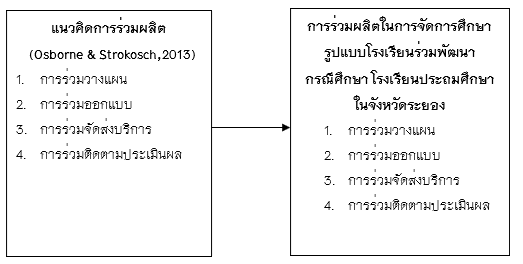Co-production in Education Management of Partnership Schools: A Case Study of the Primary Schools in Rayong Province
Main Article Content
Abstract
The purpose of this research was to study the co-production process in the educational management of the partnership schools: a case study of primary schools in Rayong Province. This study was undertaken by qualitative methods. The key informants obtained by purposive sampling were schools administrators, teachers, local administrative, organizations representative, private agency, non-governmental organization and parents of students involving in education management in the partnership schools. The research tool was semi-structured interview. The data were collected from document analysis and interviews, analyzed by content analysis.
The results showed that partnership schools provided education in a co-production manner; 1) co-planning by sponsors to participate in personnel management, academic administration, learning management, budget management and general administration; 2) co-design activities, sponsors and schools worked together to design curriculum and learning activities to meet the needs of the community; 3) co-delivery, schools were primarily responsible for managing education and supporters act to support the operation to be more efficient; and 4) co-evaluation, supporters participated in monitoring and evaluating the results of the development plan and action plans of educational institutions at both the project level and the educational institution level and periodically visit the school for follow-up during schools operations.
Downloads
Article Details

This work is licensed under a Creative Commons Attribution-NonCommercial-NoDerivatives 4.0 International License.
References
กลุ่มสารสนเทศ สนผ.สำนักงานคณะกรรมการการศึกษาขั้นพื้นฐาน. (2563). ระบบสารสนเทศเพื่อบริหารการศึกษา. สืบค้นจาก https://data.bopp-obec.info/emis/schooldataview.php?School_ID=1021470133&AreaCODE=2101
กิตติศักดิ์ อังคะนาวิน และอภิสรรค์ ภาชนะสวรรค์. (2563). การมีส่วนร่วมในการบริหารสถานศึกษาของบุคลากรทางการศึกษา โรงเรียนหัวถนน อำเภอพนัสนิคม จังหวัดชลบุรี. วารสารสหวิทยาการมนุษยศาสตร์และสังคมศาสตร์, 3(1), 13-28.
เกียรติศักดิ์ สุทธหลวง, วจี ปัญญาใส, นิตยา สุวรรณศรีและ มานี แสงหิรัญ. (2560). การพัฒนารูปแบบการมีส่วนร่วมด้านวิชาการโรงเรียนดีประจําตําบล สํานักงานเขตพื้นที่การศึกษาประถมศึกษาน่าน เขต 2.วารสารดุษฎีบัณฑิตทางสังคมศาสตร์, 7(3), 70-84.
ทีมข่าวการเมือง แนวหน้า. (2562). ผ่าประเด็นร้อน ปัญหาใหญ่ที่สุดของประเทศชาติ การปฏิรูปการศึกษาที่ไม่คืบหน้า. แนวหน้าออนไลน์. สืบค้นจาก https://www.naewna.com/politic/columnist/42304
ไทยโพสต์. (2561). โรงเรียนมีชัยพัฒนา. สืบค้นจาก https://www.thaipost.net/main/detail/7152#
ธีรเดช สนองทวีพร. (2564). ความสัมพันธ์ระหว่างการบริหารทรัพยากรมนุษย์กับประสิทธิภาพองค์การของ วิสาหกิจขนาดกลางและขนาดย่อม (SME) ในเขตกรุงเทพมหานคร. วารสารการบริหารและสังคมศาสตร์ปริทรรศน์, 4(2), 1-14.
นิติกร วรรณชาและวิรัลพัทร วงศ์วัฒน์เกษม. (2562). การมีส่วนร่วมในการจัดการศึกษาของคณะกรรมการสถานศึกษาขั้นพื้นฐานกลุ่มโรงเรียนเครือข่ายอำเภอเสลภูมิ สำนักงานเขตพื้นที่การศึกษาประถมศึกษาร้อยเอ็ด เขต 3. การประชุมวิชาการระดับชาติ ครั้งที่ 6: เรื่องสังคมผู้สูงวัย: โอกาสและความท้าทายของอุดมศึกษา (น. 747-757). นครราชสีมา: วิทยาลัยนครราชสีมา.
บริษัท สยามลวดเหล็กอุตสาหกรรม จำกัด. (2561). ธนาคารพัฒนาชุมชนและโรงเรียนบ้านหนองละลอก. สืบค้นจาก http://www.siw.co.th/index.php/th/ourstory/csr/130
ฟุกกล้าว ทิวากร, จุมพจน์ วนิชกุล และพาที เกศธนากร. (2562). องค์ประกอบที่ส่งผลต่อการบริหารการศึกษาตามแนวทางโรงเรียนร่วมพัฒนา ของโรงเรียนในสังกัดองค์การบริหารส่วนจังหวัดในเขตภูมิภาคกลาง. วารสารการบริหารการศึกษาและภาวะผู้นำ, 8(29), 175-185.
มูลนิธิสานอนาคตการศึกษา คอนเน็กซ์อีดี. (2563). เกี่ยวกับมูลนิธิ. สืบค้นจาก http://connexted.org/foundation/about
มูลนิธิสานอนาคตการศึกษา คอนเน็กซ์อีดี. (2565). การประเมินคุณภาพโรงเรียน. สืบค้นจาก https://connexted.org/public/cned/assets/files/CONNEXTED_KPIs.pdf
ระเบียบคณะกรรมการการศึกษาขั้นพื้นฐาน ว่าด้วยการกำหนดองค์ประกอบ หลักเกณฑ์ วิธีการสรรหา และจำนวนกรรมการสถานศึกษา สำหรับสถานศึกษารูปแบบโรงเรียนร่วมพัฒนา พ.ศ. 2561. (2562). ราชกิจจานุเบกษา เล่ม 136 ตอนพิเศษ 17 ง วันที่ 17 มกราคม 2562 หน้า 5-6.
วิจารณ์ พานิช. ( 2564). การแก้ปัญหาความเหลื่อมล้ำทางการศึกษาในมุมของ ศ.นพ.วิจารณ์ พานิช. สืบค้นจาก https://iamkru.com/2021/04/29/growth-mindset/
วิทยากร เชียงกูล. (2562). ปัญหาหลักของการศึกษาไทย. สืบค้นจาก https://www.bangkokbiznews.com/blog/detail/647483
สมหวัง พันธะลี และปภาวรินทร์ เรืองประจวบกุล. (2563). การศึกษาผลการสร้างเครือข่ายนิเทศเพื่อยกระดับคุณภาพการศึกษาสำหรับนิเทศก์ สำนักงานศึกษาธิการจังหวัด. คุรุสภาวิทยาจารย์, 2(2), 121-133.
สมาคมพัฒนาประชากรและชุมชน. (2564). โครงการโรงเรียนร่วมพัฒนา. สืบค้นจาก https://pda.or.th/current-project-psp-2020/
สำนักงานคณะกรรมการการศึกษาขั้นพื้นฐาน, กระทรวงศึกษาธิการ. (2561). คู่มือการปฏิบัติงานโครงการโรงเรียนร่วมพัฒนา. กรุงเทพฯ: โรงพิมพ์อักษรไทย.
สำนักงานรับรองมาตรฐานและประเมินคุณภาพการศึกษา (องค์การมหาชน). (2560). กรอบแนวทางการประเมิน คุณภาพภายนอกรอบสี่ (พ.ศ. 2559-2563). ม.ป.พ.: ม.ป.ท.
สำนักนโยบายและยุทธศาสตร์ สำนักงานปลัดกระทรวงศึกษาธิการ. (2560). รายงานผลการพัฒนาการศึกษาในพื้นที่เขตพัฒนาพิเศษภาคตะวันออก ประจำปีงบประมาณ พ.ศ. 2561 ของ กระทรวงศึกษาธิการ. สืบค้นจาก https://www.moe.go.th
อัญชิรญา จันทรปิฏก. (2563). บทวิเคราะห์ “บทบาทรัฐ-สาธารณะ” ในการจัดบริการสาธารณะตามแนวคิดการร่วมผลิต. วารสารมหาวิทยาลัยราชภัฏยะลา, 15(2), 240-247.
อัญชิรญา จันทรปิฏก. (2564). รูปแบบการร่วมผลิตในการดำเนินการด้านที่อยู่อาศัยสำหรับผู้สูงอายุในประเทศไทย. (ดุษฎีนิพนธ์รัฐประศาสนศาสตรดุษฎีบัณฑิต, สาขาวิชานโยบายสาธารณะและการจัดการภาครัฐ มหาวิทยาลัยมหิดล).
อินโฟเควสท์ (RYT9). (2561). สยามลวดเหล็กฯ ตอกย้ำปณิธานเดินหน้าพัฒนาคุณภาพชีวิตชุมชนฉายความสำเร็จ School BIRD ต่อยอดชุมชนพึ่งพาตนเองได้อย่างยั่งยืน. สืบค้นจาก https://www.ryt9.com/s/prg/2789680
Bloom, B. S. (1976). Human characteristics and school learning. New York: McGraw-hill.
Dhirathiti, N. (2018). Co-production and the provision of lifelong learning policy for elderly people in Thailand. Public Management Review, 21(7), 1011-1028. DOI: 10.1080/14719037.2018.1540723
Etgar, M. (2009). Ways of engaging consumers in co-production. Retrieved from https://timreview.ca/article/307
Hood, C. (1991). A public management for all seasons. Public Administration, 69(1), 3-19.
Löffler, E. (2009). A future research agenda for co-production: Overview Paper, In Local Authorities & Research Councils’ Initiative (2010) Co-production: A series of commissioned reports. Swindon: Research Councils UK.
Osborne, S. P., and Strokosch, K. (2013). It takes two to Tango? Understanding the co-production of public services by integrating the services management and public administration perspectives: It takes two to Tango?. British Journal of Management, 24, S31–S47. doi:10.1111/1467-8551.12010
Ostrom, E., Parks, R. B., Whitaker, G., P. and Percy, S.L. (1978). The public service production process: A framework for analysis police service. Policy Studies Journal, 7(S1), 381-389.
Strokosch, K. (2012). Understanding the coproduction of public service: A case of asylum seekers in Glasgow. (Business and Management Dissertation, Business School, University of Edinburgh).


